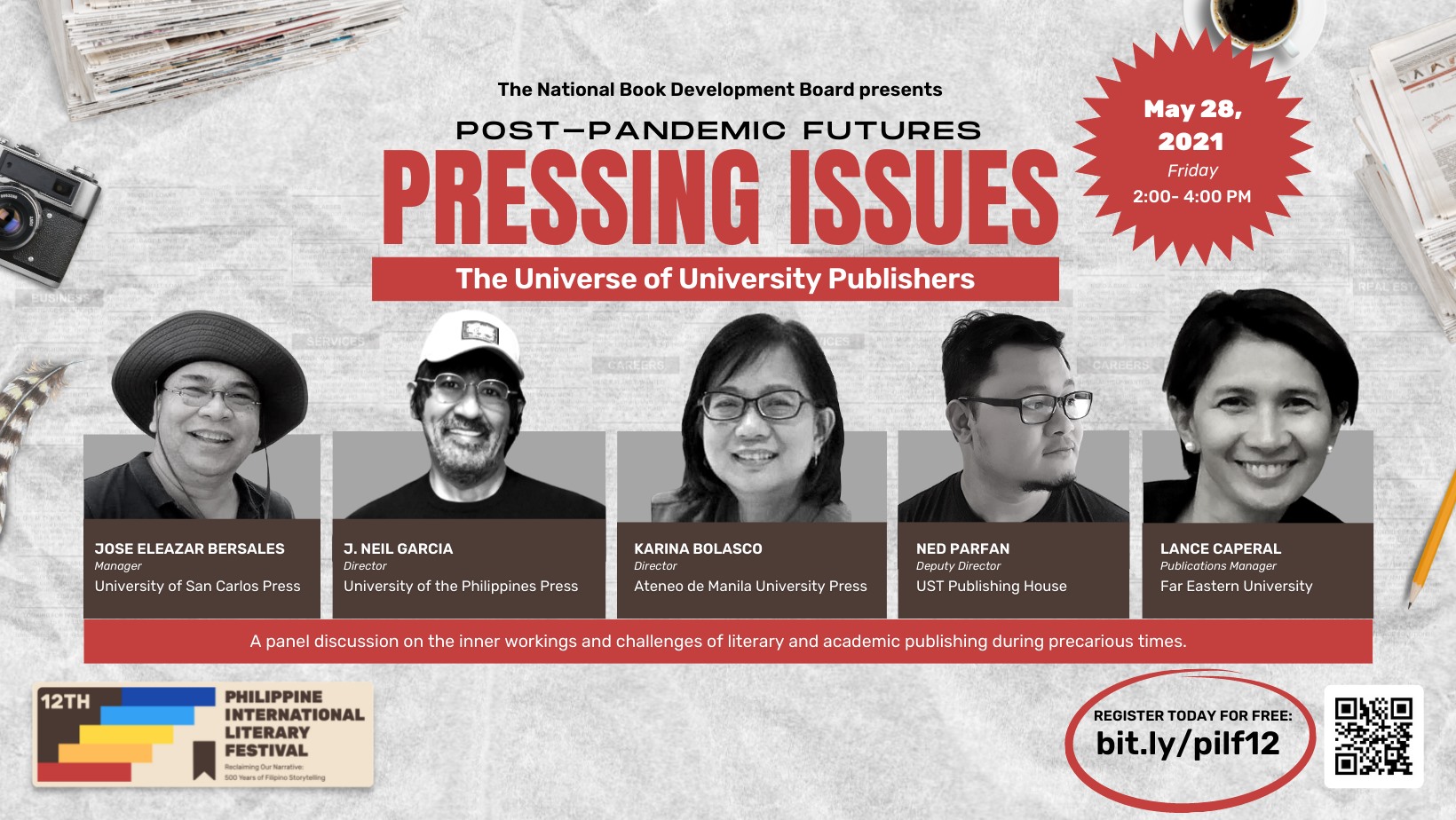The COVID-19 pandemic was no hindrance to the National Book Development Board (NBDB) as they took online platforms to celebrate the 12th Philippine International Literary Festival with the theme, “Reclaiming our Narrative: 500 years of Filipino Storytelling.” The festival, which began in April and is set to end this December, features several virtual events including seminars and summits. The NDBD will also be providing grants and opportunities to aspiring writers and publishers.
One of the festival’s many online activities was a webinar held last May 28 titled, “Pressing Issues: The Universe of University Publishers,” which was streamed on Facebook, YouTube, and Kumu. The event featured five speakers from top university presses in the Philippines to discuss the present reality of literary and academic publishing amidst COVID-19 and how they overcame challenges brought about by the pandemic.
The first speaker was Dr. Jose Eleazar Bersales, the director of the University of San Carlos Museum and the manager of the USC Press based in Cebu, who shared how the press adjusted to the new reality brought by the pandemic. In October 2020, the university press began working with the USC Museum to create webinars and opted for selling their books on online platforms such as the press’ website and Facebook account.
Ms. Lance Espinosa-Caperal, the publications manager for the Far Eastern University (FEU) Press, talked about how they navigated their publishing operations during the pandemic. She also emphasized the importance of maintaining communication with teams and stakeholders to keep work efficient and trust strong in the virtual workplace. The FEU Press transitioned from physical to virtual book launches and fairs, beginning to sell their books through online shops such as Shopee and Lazada. Through this, the press was able to present more titles online than they would have in a physical setting.
From the University of Santo Tomas (UST) Publishing House was deputy-director Mr. Ned Parfan, who spoke on the difficulties of adjusting to the world of e-commerce as UST focused on selling their books online. Parfan shared their experiences dealing with couriers and damaged orders. Despite this, e-commerce had its benefits. The UST Press saw how their low-selling print books sold faster and gained more orders than they did when they were physically displayed.
Dr. J. Neil Garcia, the University of the Philippines (UP) Press Director, shared that the pandemic did not hamper the UP Press’s productivity. With continuous operations of their physical and virtual stores, the UP Press exceeded its income projection for the year 2020 contrary to their expectations. The success was partially credited to the flexibility of online shopping schedules and the broader space on which the press could display more titles.
Garcia also touched on the subject of e-books, saying that print books will always triumph over their digital counterparts. From the UP Press’ experience alone, their print books still outsold e-books during the pandemic. Furthermore, Garcia imparted a poignant message that the “inescapable value of books'' will endure in the post-pandemic world and that the UP Press shall continue their operations as they, like other presses, are responsible for the circulation of scholarly and literary information that shall shape the Filipino mind.
The final speaker was Ms. Karina Bolasco, the director of the Ateneo University Press, who discussed the importance of maintaining their vision and mission as they adjusted during the pandemic. She stated that they must still do their part in nation-building by publishing books that have an impact on society.
Like the other presses, the Ateneo Press held virtual events and seminars on topics that engaged the public as well as selling their books on online platforms where sales also exceeded expectations. The press also provides e-books through their Rizal Library E-Resource. Bolasco also expressed how the power of books, be it academic or literary, helps in bringing about a new social contract to create change such as recognizing the dangers of capitalism.
The event ended with a roundtable discussion where the five speakers discussed where and how they would direct the future of their respective presses into the post-pandemic world. Of all the pressing issues of book publishing covered in the webinar, the speakers shared the same concern that the most pressing remains the issue of health and safety. This is not only limited to their workplaces but also to the people who wish to acquire their books amidst the pandemic.
For more information about the 12th Philippine International Literary Festival, you can visit the NBDB website here.


